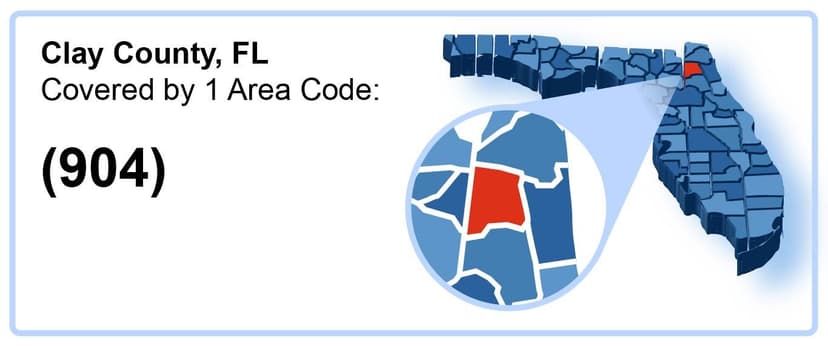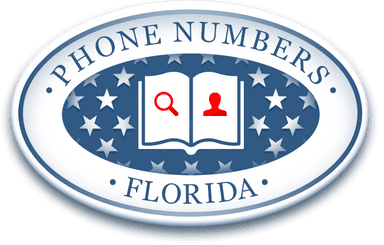What are Clay County Area Codes?

Area codes are the first three digits that appear at the beginning of North American telephone numbers. They identify the actual Numbering Plan Areas (NPA) in the North American Numbering Plan (NANP) where the call originates. The Florida Public Utilities Commission regulates and maintains area codes in the state.
Area Code 904
Area code 904 is the telephone area code that covers the northeast region of the State of Florida. Area code 904 was assigned in 1965 when the northern half of Florida was split into a separate numbering plan. Area code 904 covers several major cities in Clay County. Some of these cities include Jacksonville, Green Cove Springs, Keystone Heights, Orange Park, and Lakeside Village.
What are the Best Cell Phone Plans in Clay County?
The cell phone carrier with the widest coverage in Clay County is Verizon, with 94% coverage. AT&T follows closely with 86% coverage and Sprint with 80% coverage. The cell phone carrier with the least coverage is T-Mobile, with 74% coverage.
The 2018 National Center of Health Statistics survey estimated that 60.9% of the Florida adult population used only wireless telephones, while only 4.4% of Florida adults used landlines. Among the minors in Florida, 72.9% preferred wireless-only services, while only 1.7% used landline telephony services. From this survey, it is evident that the use of cell phones supersedes the use of landlines in Clay County.
Voice over Internet Protocol, or VoIP as it is commonly known, refers to technology that uses Internet Protocol networks to perform phone services and deliver multimedia sessions. VoIP users do not use regular telephone lines for their telephony services. Instead, they rely solely on broadband internet connections and local area networks. Simply put, VoIP calls are made using the internet network connections instead of public switched telephone networks (PSTN).
In Clay County, VoIP is gradually taking over the telecommunications system due to its flexibility and cheaper call cost. VoIP and internet calls are relatively cheaper than other traditional telephone calls. Most VoIP advanced services come in subscription plans and are relatively less expensive than traditional phone service plans, which do not provide the same advanced services.
What are Clay County Phone Scams?
Phone scammers use false promises, aggressive sales pitches, and phony threats to get their targets to share sensitive personal and financial information over the phone. Technology has made it easier for phone scammers to use telephony services to steal money from their targets. They pose as government agencies, financial institutions, and legitimate businesses and threaten their targets arrest, confiscation of property, freezing of bank accounts, etc. These scammers claim that all of these can be resolved if the targets provide their personal information or make immediate payments. Scammers use spoofing tools to copy the Caller IDs of legitimate government agencies or business telephone numbers.
Phone scams are acts perpetrated by fraudsters over the phone. A reverse phone lookup application can help you identify suspicious callers and avoid phone scams. The Federal Communications Commission (FCC) provides information on Caller ID spoofing and how to avoid them. The following are some common scams in Clay County:
What are Clay County Impersonation Scams?
In impersonation scams, residents of Clay County receive unsolicited calls from people claiming to work for legitimate government agencies, organizations, or businesses. The most common variant of this scam is when a caller claiming to be an officer of the Clay County Sheriff’s Department tells the recipient that there is a warrant out for their arrest. They claim that they can resolve the issue over the phone if the target pays a certain amount of money. Typically, the scammer will tell the recipient that it usually costs thousands of dollars in settlement or court costs to resolve the matter, but the recipient can simply pay a small amount of money to resolve it over the phone. The Clay County Sheriff’s Department has cautioned residents to be wary of these types of calls because the department does not call residents with threats and ask for payment of fines over the phone. Residents can conduct phone number searches to identify scam callers.
What are Clay County Internal Revenue Service (IRS) Scams?
In Clay County, Internal Revenue Service scams involve scammers posing as tax agents to collect payments from residents, claiming that they owe back taxes. They then threaten residents with impending audits or arrest if they do not make payments immediately. The scammers usually request that payment be made via gift cards or wire transfers. Note that IRS officials do not make such calls. The IRS typically initiates contact with taxpayers through regular postal mail or email. Victims of tax scams can log complaints by contacting the Treasury Inspector General for Tax Administration (TIGTA) at 1-800-366-484 or report online. Individuals can also file complaints with the Federal Trade Commission. Residents can also perform phone number lookups with reverse phone lookups tools free of charge
What are Clay County Investment Scams?
In Investment scams, scammers call their targets with seemingly good investment offers that promise high returns with little or no risks. Scammers usually use phrases such as “incredible gains,” “once in a lifetime,” “breakout stock pick,” or “huge upside and almost no risk.”. If the targets commit to such offers, the investment ends up being non-existent, worthless, or worth much less than promised. Most “get rich quick” schemes are scams, so recipients of such offers should exercise caution. Phone number lookup services can verify if these calls are from legitimate businesses.
What are Clay County Charity Scams?
In charity scams, scammers impersonate officials or members of legitimate charity organizations. They call targets, asking for money on behalf of charity organizations. This scam is more common after a natural disaster or pandemic has occurred. They take advantage of such events to defraud the victims of their money. While legitimate charity organizations call and solicit donations, recipients of such calls must still exercise caution when dealing with such calls. It is advisable to verify the charity organization before donating funds to them. A reverse phone search can verify if the person is actually from a legitimate charity.
What are Clay County Jury Warrant Scams?
In jury warrant scams, Clay County residents receive phone calls from callers identifying themselves as officers of the court, local police department, or District Attorney’s office representatives. They tell their targets that they missed jury duty summons; therefore, there are warrants out for their arrests. Typically, most residents instinctively respond that they never received such notices, which will then cause the callers to ask for personal identifying information, such as the birth date and social security number, for “verification purposes.” However, this information is used for identity fraud. After getting the personal identifying information, the scammers tell the recipients that they can clear their records if they pay certain fines by credit cards or prepaid cards.
Note that once these scammers have access to your credit card information, they can defraud you of all your money. If you are worried that you may have missed jury duty, call the appointed court to find out. Reverse phone number lookup services can verify if these calls are from legitimate law enforcement agencies.
What are Robocalls and Spam Calls?
Robocalls are automated phone calls made to deliver pre-recorded messages, usually from telemarketers, political campaigns, and non-profit organizations. Robocalls calls are automated and sometimes instruct recipients to press certain keys to speak with live agents or reel out phone numbers for them to call back. Fraudsters use robocalls to scam innocent people for their money. Phone scammers often mask their identities by displaying fake caller ID information when employing robocalls. This is also known as caller ID spoofing. These fraudsters take up the caller IDs of government agencies or familiar organizations and pretend to be their employees. Phone scammers use robocalls because they can target many more people with little or no human effort and at a minimal cost. A reverse phone number search can help differentiate a robocall from a live call. The Federal Communications Commission (FCC) also provides information on caller ID spoofing and how to avoid them.
If you receive a robocall, it is advisable to do the following:
- Hang up the call. Do not follow any of the prompts given; doing so will lead to more robocalls.
- Use third-party call blocking tools that offer phone number searches free of charge to identify robocalls and block them.
- Report illegal robocalls to the FTC online or call 1-888-382-1222.
- Register your number on the Florida Department of Agriculture and Consumer Services (FDACS) Do Not Call List.
- Include your number in the National Do Not Call Registry. Inclusion in this registry exempts you from receiving robocalls and other sales calls from telemarketers and businesses. While this will not stop all unwanted calls, it is easier to identify illegal robocalls as possible phone scams.
Consumer information on how to block unwanted calls on any platform is available on the Federal Trade Commission website.
How to Spot and Report Clay County Phone Scams?
Scammers keep propounding more aggressive ways to defraud their targets. They use all manners of deceitful tactics to gain access to information they can use to steal residents’ valuables. Residents of Clay County can combat scams by being vigilant and educated. Tools such as reverse phone number lookup services can be used in identifying scammers. Indications that a phone call is a scam include:
- An unsolicited call from a person claiming to work for a government agency or legitimate business. Note that these agencies and businesses rarely call you unless they have first communicated by other means or you initiated the contact.
- Calls threatening arrest, audits, suspension, or pressure to reveal sensitive personal information are most likely scams. End the call immediately.
- Offers that seem too good to be true. For example, calls offering lotteries, free product trials, cash prizes, cheap travel packages, medical devices, and low-risk, high-return investments. Hang up such calls.
- Any automated sales call from a company you have not authorized to contact you. Such a call is illegal and almost certainly a scam.
- The caller always provides specific instructions that payments should be made via gift cards, bitcoins, and wire transfers to particular accounts. With these payment methods, the funds, once transferred, will be untraceable and impossible to retrieve.
Services that conduct reverse phone number lookups by address, name, and phone number are helpful against phone scams. Some of the public institutions in Clay County that are committed to fighting deceptive business practices and fraud include the following:
Clay County State’s Attorney Consumer Protection Division - The Consumer protection division is a section in the State Attorney’s Office that protects consumers from fraudulent persons and businesses. The Unit maintains a consumer fraud 1-800-321-5366 that handles public inquiries on consumer matters.
Clay County Sheriff’s Department - The Clay County Sheriff Office provides information and updates on prevalent scams in the county. Clay County residents who have been victims of phone scams can report them to the Sheriff’s Department.
Florida Department of Agriculture and Consumer Services - The FDAC provides residents with relevant information and helps protect them from fraud and deceptive practices. Residents who have been victims of fraud can file complaints with the FDACS.
Better Business Bureau - The Better Business Bureau is the premium source of information on legitimate business entities registered in Clay County.
Federal Trade Commission - The FTC protects consumers from deceptive and fraudulent practices. The FTC initiated the National Do Not Call Registry as part of its efforts to eliminate unwanted calls. If you added your number to the DNC register but continue to receive unsolicited calls, such calls are most likely scam calls. Report such calls and other phone scams to the FTC.
